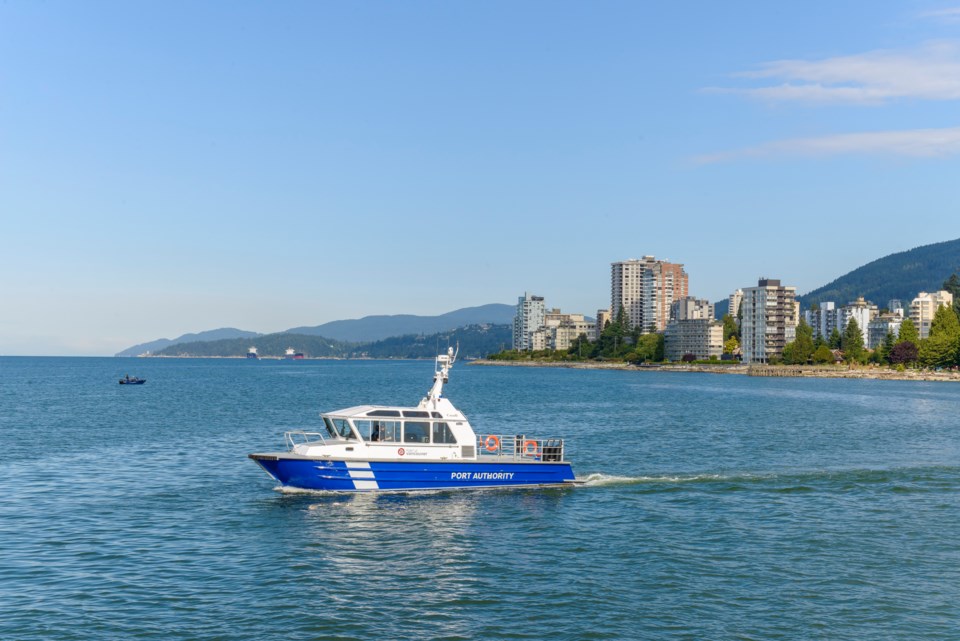While the summer months are a great time to go boating in the sunshine, it’s also important that we prioritize keeping everyone sharing space on the water safe and protected.
The Â鶹´«Ã½Ó³»Fraser Port Authority is responsible for maintaining the safe and efficient movement of marine traffic within the Port of Vancouver. In partnership with other agencies, the port authority regularly assists to keep shipping lanes clear of small vessel traffic and they are strongly encouraging boaters to follow the safety guidelines when taking recreational boats and watercrafts out on the waterways.
Before you and your small crew set sail, here are some safe boating tips on how you can do your part to maintain the safe and efficient movement of marine traffic:
1. FOLLOW PHYSICAL DISTANCING GUIDELINES
As a general rule of thumb, avoid any unnecessary contact with others during your trip. Transport Canada to reduce the spread of COVID-19 through marine transportation:
-
Respect the health authority's measures with respect to the make-up and size of your boating group.
-
Don't share your boating or fishing equipment.
-
Keep a distance of at least two metres from other people and other boats as much as possible. For scale, that is the length of half a canoe or one fishing rod.
-
In instances when you can’t keep a distance, consider wearing a non-medical mask or face covering.
2. BRING ALONG THE NECESSARY EQUIPMENT
Equip your boat with precautionary safety items, such as a flashlight, a whistle, and a sound-signalling device. Ensure everyone on board is wearing a lifejacket or a personal flotation device.
3. BE MINDFUL OF OTHERS ON THE WATER
Keep a lookout for other boaters around you, including those on kayaks, paddleboards, canoes, and other human-powered watercraft. Avoid boating in swimming areas.
4. NEVER GET BETWEEN A TUGBOAT AND ITS TOW
Tow cables are often submerged and not visible.
5. WATCH OUT FOR LARGE SHIPS
Large, deep-sea cargo ships have limited visibility, so don’t assume they can see you. These large ships also can’t move quickly, especially in narrow channels. Even if you have the right-of-way, you must yield to them.
Photo provided by Â鶹´«Ã½Ó³»Fraser Port Authority.
6. BE AWARE OF SPEED RESTRICTIONS
Waterways are busier in the summer season, so it’s important to operate your boat at a safe speed, Consult the port authority’s to follow the official speed limits, including new restrictions in Indian Arm.
7. MONITOR THE CONDITIONS
Consider environmental conditions — such as wind, weather, currents and tides — to help you prepare for the safest route.
During the summer months, the freshet runoff can increase current flows, debris, and water levels, having a significant impact on bridge clearances and river bed depth in the Fraser River. In the event you require assistance, contact Marine Communications and Traffic Services on VHF channel 16 or *16 on a mobile phone.
8. REMAIN IN COMMUNICATION
At all times, monitor VHF (Very High Frequency) 16 on your radio to learn about restricted areas. In Burrard Inlet, monitor VHF 12, and on the Fraser River, monitor VHF 74. Pay close attention to the following warning signals: one prolonged blast is a warning, and five or more short and rapid blasts of a ship’s whistle means “danger – stay clear.”
9. REPORT INCIDENTS
If you witness anyone violating safe boating practices, contact the port authority’s Operations Centre — available 24/7 — at 604.665.9086 to report the incident. In an emergency, press *16 on your mobile phone, VHF 16 on your radio, or phone 911.
10. REPORT MARINE WILDLIFE SIGHTFULS
During your boating trip, you may get lucky and spot a whale, dolphin, porpoise, or other sea creatures.
If you do, please report your sighting using the B.C. Cetacean Sightings Network’s . Real-time information is sent to the crew and pilots of large commercial vessels and ferries so they can adjust their speed to reduce the risk of disturbing or colliding with marine mammals.
To review the safe boating guides for Burrard Inlet and the Fraser River, visit .



